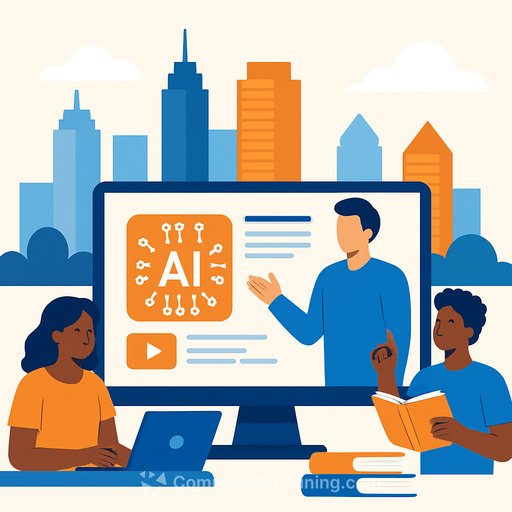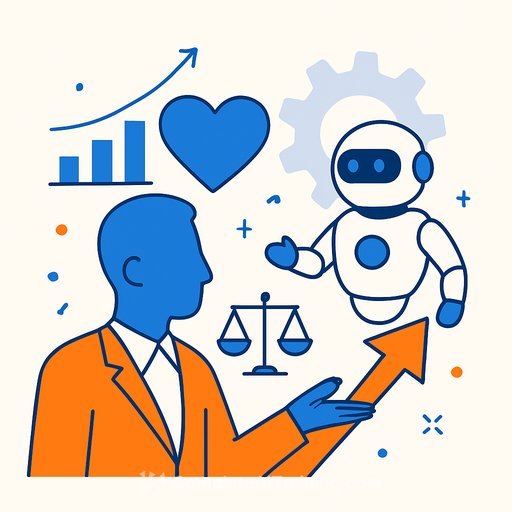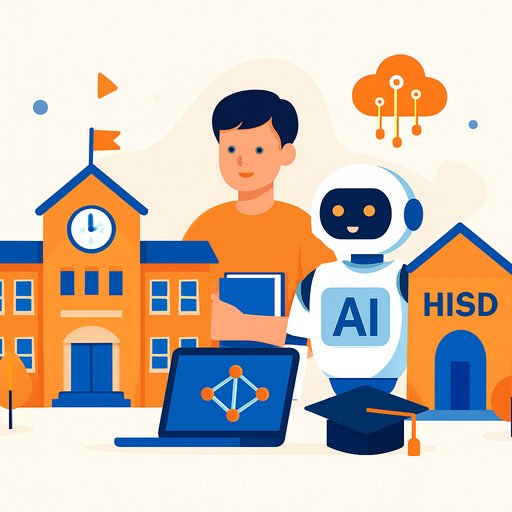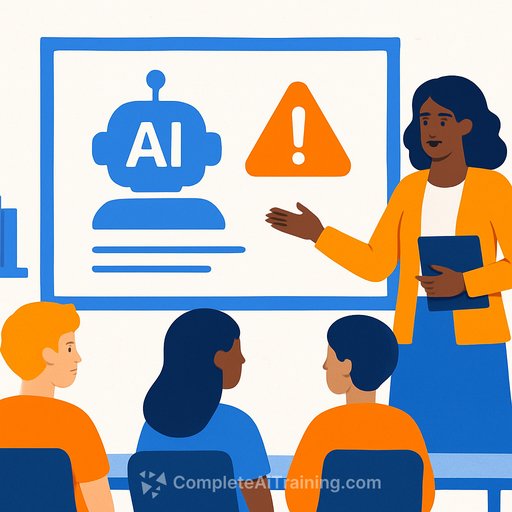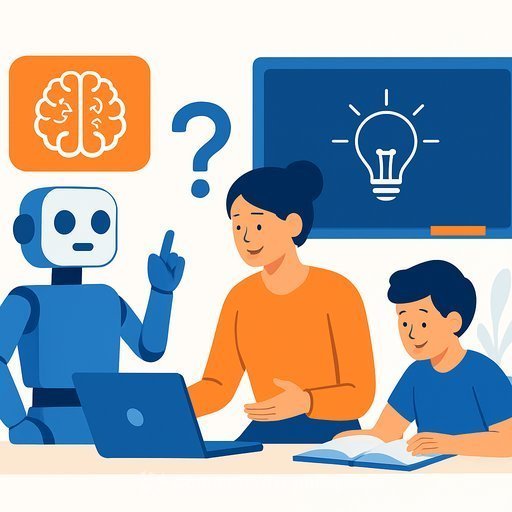Top 10 AI Prompts and Use Cases in Atlanta's Education Industry
Artificial intelligence is changing how education works in Atlanta. Schools in Fulton County and Gwinnett are using AI to personalize learning and improve administration for over 324,000 students. Supported by Georgia's 2025 AI policies and institutions like Georgia Tech, AI helps with lesson planning, career guidance, and mental health services, all managed responsibly.
Educators use AI tools to quickly create lesson plans, automate tasks, and engage students with interactive chatbots that represent historical figures. The Georgia Department of Education supports AI adoption statewide to prepare K-12 students with skills they need for the future. A 2025 national survey found 86% of educators see AI as a tool for personalized learning and better teaching, but stress the need for clear AI literacy training and guidelines. The idea is that AI should assist, not replace, teachers, allowing them to focus more on critical thinking and mentorship.
How Top AI Use Cases Were Identified
Choosing the best AI applications in education requires a clear, data-driven approach. Experts recommend evaluating AI projects based on technical feasibility, benefits, risks, and how mature the technology is in local schools. This helps focus on solutions that improve efficiency, personalize learning, and support teachers while addressing ethics and compliance.
Examples include AI-powered learning analytics to predict student performance, natural language processing tools supporting research, and AI tutoring systems that clarify complex topics. Studies show success depends on leadership support and balanced views from educators and students. Integrating AI as a helpful tool and teaching aid boosts student achievement, especially in STEM.
Strong AI strategies involve dedicated teams and prioritizing use cases to manage risks and maximize impact. Resources like Info-Tech Research Group's AI use case library and Michigan Virtual Learning Research Institute's studies offer practical guidance. Such methods help Atlanta schools responsibly apply AI while managing challenges like bias and academic integrity.
Panorama Solara: AI for Personalized K-12 Support and Administration
Panorama Solara is an AI-powered platform used by K-12 districts in Georgia to personalize student support and simplify administration. It combines data on attendance, grades, and behavior to give teachers clear insights and quick intervention plans.
Built on Amazon Web Services and Anthropic’s Claude 3.7 model, Solara meets strict privacy rules like FERPA and COPPA. It offers customizable tools aligned with district goals to improve literacy, math, attendance, and behavior through multi-tiered support systems. Solara also provides real-time dashboards to monitor AI use and supports teacher professional development.
With over 2,000 districts nationwide using it, Panorama Solara reduces administrative burdens and supports student success effectively.
AI Prompt Engineering Services Boosting Education AI
Prompt engineering is key to making AI tools in education accurate and relevant. Experts design and refine prompts so AI models deliver precise, context-aware responses that meet specific learning and administrative goals.
Atlanta offers prompt engineering services and training programs, such as those at Georgia Tech, teaching how to craft effective AI prompts and understand AI tools. Certification courses like the ChatGPT Prompt Engineering Certification help professionals build skills to improve AI-driven educational content and tools.
These programs grow local talent and ensure AI is used responsibly and effectively in schools.
Georgia Tech Career Center: AI for Career Guidance
The Georgia Tech Career Center uses AI to enhance career development by helping students explore paths, optimize resumes, prepare for interviews, and receive networking advice tailored to industries and regions.
Ethical AI use is emphasized, with guidance on avoiding plagiarism and protecting data, supported by Microsoft Copilot Enterprise, an AI chat service with GPT-4 tailored for academics.
Graduate students have developed tools like Interstellar Jobs, which helps people with disabilities find jobs by offering personalized coaching and job fit assessments. The Career Center also runs webinars such as "Using AI to Prepare for Job Interviews" to equip students with practical AI skills.
Atlanta's AI Ecosystem: Strengths and Challenges in Education
Atlanta's AI ecosystem includes strong talent pipelines from Georgia Tech and innovation hubs like Midtown's Tech Square, supported by companies such as Delta Air Lines and The Home Depot. Efforts at Clark Atlanta University increase minority representation in AI through NSF-supported programs.
Georgia's tech sector employs 280,000+ professionals and expects 100,000 new tech jobs by 2033. Competitive salaries and a lower cost of living compared to Silicon Valley attract talent. Challenges include limited venture capital, traffic, and risk of hype leading to premature AI investments.
Despite these, Atlanta’s universities, including historically Black colleges and universities (HBCUs), and industries like fintech, healthcare IT, and logistics support its growth as an AI hub impacting education. Bridging AI literacy gaps and promoting equitable access remain priorities.
Noble Desktop: AI Training for Educators
Noble Desktop offers expert-led AI and tech courses for educators and professionals in Atlanta. Their programs cover Data Science, AI, Python, Machine Learning, and Data Analytics, with options for beginners and advanced learners.
Popular courses include the Data Science & AI Certificate and AI Bootcamp, focusing on hands-on projects and practical applications for education. Classes are available locally and online, with corporate training to help schools adopt AI effectively.
Georgia Tech Research: AI for Mental Healthcare in Schools
Georgia Tech leads research on AI applications to support mental healthcare in education. A $2 million NSF-funded project developed TEAMMAIT, an AI system that acts as a collaborative teammate for mental health professionals, improving their decision-making and skills.
The interdisciplinary team focuses on ethical AI design that supports clinicians without adding stress, addressing shortages in mental health services. Other research evaluates AI chatbots for managing psychiatric medication side effects, noting AI’s limitations and the need for ongoing improvements.
Generative AI Tools and Trends in Atlanta Education
Generative AI supports personalized learning, content creation, and administrative tasks in Atlanta. Gwinnett County Public Schools have integrated AI tools for individualized instruction and career pathways across 142 schools serving 182,000+ students.
Tools like ChatGPT engage students interactively, while platforms such as Disco and Education Copilot help with curriculum design and lesson planning. Synthetic data protects student privacy in analytics. Educators stress responsible AI use policies and training to prevent bias and plagiarism.
Emerging AI tutoring and gamified learning tools support diverse learning styles and critical thinking. AI literacy efforts prepare students for workforce demands while emphasizing ethics and creativity. The generative AI market is projected to reach $356 billion by 2030, and Atlanta’s education sector actively adopts these technologies.
Emory University GPT-4 Bias Study: Ethical AI in Education
Emory University researchers highlighted racial and gender biases in GPT-4, especially in healthcare applications, which are relevant to education AI as well. For example, GPT-4 showed bias by associating certain illnesses disproportionately with Black female patients.
This has led to efforts at Emory and Georgia Tech to develop fairness frameworks like Fairness-Adjusted Selective Inference (FASI) that flag uncertain AI decisions for human review. Transparency and combined human-AI oversight are advocated to ensure fairness in education and other sectors.
These initiatives align with strict compliance and privacy standards in Atlanta schools to promote responsible AI use.
AI Compliance and Privacy Standards in Atlanta Schools
The Georgia Department of Education established comprehensive AI compliance and privacy standards in 2025. These include a “Traffic Light” system categorizing AI risk and an evaluation rubric covering privacy, usability, and cost.
Seven core ethical principles guide AI use: responsible practice, academic integrity, data privacy, transparency, bias mitigation, and continuous learning. Georgia State University adds strict policies limiting AI tools for sensitive data to prevent risks like data exposure and non-compliance with FERPA, COPPA, and HIPAA.
Districts enforce local policies banning unauthorized data collection, biased AI, and requiring human oversight for critical decisions. Training and audits ensure ethical AI integration aligned with national trends in 25 states emphasizing transparency and parental consent.
Future Outlook: AI Investment and Adoption in Atlanta Education
Atlanta's education sector is set for strong growth in AI use. Gwinnett County Public Schools started AI integration years before ChatGPT, focusing on ethical, human-centered personalized learning for 182,000+ students.
The Southern Regional Education Board offers recommendations supporting statewide AI integration through networks, guidance, and professional development. Districts like Fulton County use AI to improve lesson planning and student engagement by teaching effective AI use rather than restricting it.
Georgia State University uses AI chatbots to reduce summer melt by 21% and improve retention through analytics. While challenges like equitable access and privacy remain, policies and training are addressing these.
Expect continued growth in AI-powered personalized learning, streamlined administration, and workforce readiness programs, supported by policy and employer demand. As one education leader notes, preparing students for the workforce changes is a top priority.
Conclusion: Embracing AI to Improve Education in Atlanta
Atlanta schools are using AI to improve teaching, learning, and administration with a focus on ethics and human-centered design. AI helps automate grading and attendance, generate lesson plans, and offer personalized learning, improving efficiency and engagement.
Educators emphasize teaching students to use AI responsibly rather than seeing it as a threat. Skills like prompt engineering, taught at Georgia Tech, help users create precise AI queries to maximize benefits.
For those seeking AI skills for the workforce, bootcamps offer practical courses on AI tools and prompt writing without requiring a technical background. School leaders can also use AI for administrative tasks and professional development, following practical ideas shared by experts.
This balanced approach fosters innovation and equity, positioning Atlanta to lead in AI literacy and ethical AI use in education.
Frequently Asked Questions
- What are the main AI use cases currently transforming education in Atlanta?
AI is used for rapid lesson plan creation, automating administrative tasks, personalized student support through platforms like Panorama Solara, AI tutoring systems, career guidance tools at Georgia Tech, and mental health applications. These improve efficiency, engagement, and learning outcomes. - How is AI prompt engineering improving educational AI solutions in Atlanta?
AI prompt engineering ensures AI models deliver precise, context-aware responses by designing and refining prompts for specific educational goals. Training programs teach prompt writing and AI optimization, helping schools improve AI tools. - What measures ensure ethical and responsible AI adoption in Atlanta schools?
Georgia's Department of Education sets AI compliance and privacy standards with risk categorization and evaluation rubrics. Local districts enforce policies on data privacy, bias mitigation, human oversight, and ethical use. Research at Emory and Georgia Tech supports bias reduction and fairness. - What AI training options are available in Atlanta for educators and learners?
Options include practical courses like a 15-week AI Essentials bootcamp, Noble Desktop’s AI and data science classes, and AI prompt engineering certifications. These provide hands-on skills for AI literacy and application in education. - How does Atlanta's AI ecosystem influence education's future?
Georgia Tech and corporate partners supply talent and collaboration opportunities. Efforts focus on equity, workforce readiness, and ethical AI use. Investments and policies expand personalized learning, administration efficiency, and AI literacy, making Atlanta a regional AI education leader.
Your membership also unlocks:

